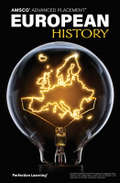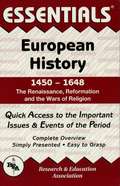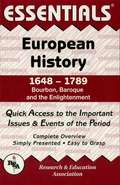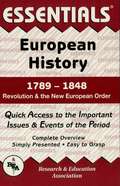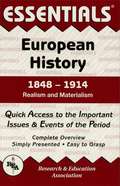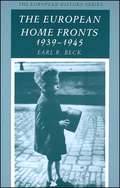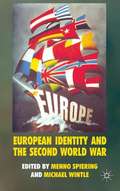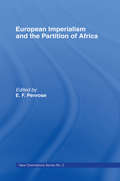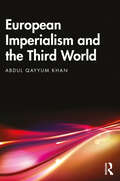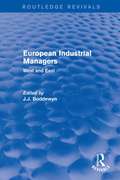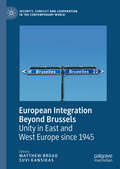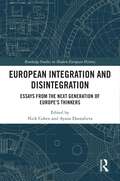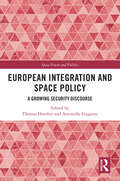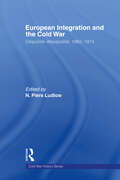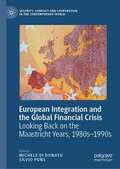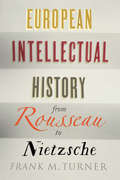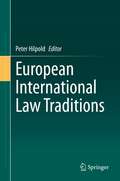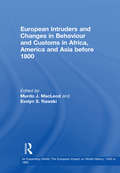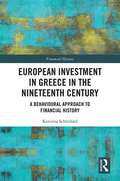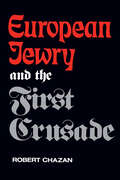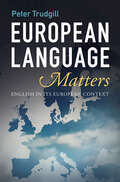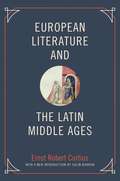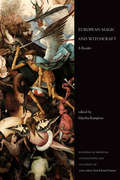- Table View
- List View
European History: 145 to 1648 Essentials
by Allen HorstmanREA's Essentials provide quick and easy access to critical information in a variety of different fields, ranging from the most basic to the most advanced. As its name implies, these concise, comprehensive study guides summarize the essentials of the field covered. Essentials are helpful when preparing for exams, doing homework and will remain a lasting reference source for students, teachers, and professionals. European History: 1450 to 1648 covers the late Middle Ages, the Renaissance, the Reformation, Martin Luther, the European wars of religion, the Thirty Years' War, the Age of Exploration, the Scientific Revolution, and the Peace of Westphalia.
European History: 1648 to 1789 Essentials
by William H. BurnsideREA's Essentials provide quick and easy access to critical information in a variety of different fields, ranging from the most basic to the most advanced. As its name implies, these concise, comprehensive study guides summarize the essentials of the field covered. Essentials are helpful when preparing for exams, doing homework and will remain a lasting reference source for students, teachers, and professionals. European History: 1648 to 1789 covers mercantilism, beginnings of modern science and the Enlightenment, Bourbon France, the Hapsburgs, the Hohenzollerns, the English Civil War, the Restoration, Peter the Great and Russia, the Papacy, the Ottoman Turkish Empire in Europe, and the culture of Baroque and Rococo.
European History: 1789 to 1848 Essentials
by John W. BarrettREA's Essentials provide quick and easy access to critical information in a variety of different fields, ranging from the most basic to the most advanced. As its name implies, these concise, comprehensive study guides summarize the essentials of the field covered. Essentials are helpful when preparing for exams, doing homework and will remain a lasting reference source for students, teachers, and professionals. European History: 1789 to 1848 includes the French Revolution, the era of Napoleon, the Congress of Vienna, the Industrial Revolution, the impact of thought systems on the European world, the Concert of Europe, and the failure of the revolutions of 1848.
European History: 1848 to 1914 Essentials
by William T. WalkerREA's Essentials provide quick and easy access to critical information in a variety of different fields, ranging from the most basic to the most advanced. As its name implies, these concise, comprehensive study guides summarize the essentials of the field covered. Essentials are helpful when preparing for exams, doing homework and will remain a lasting reference source for students, teachers, and professionals. European History: 1848 to 1914 discusses the failure of the revolutions of 1848, realpolitik and nationalism, the Crimean War, capitalism and the New Left, Karl Marx, the Second French Republic and the Second Empire, Imperial Russia, the Balkan States and the end of the Ottoman Empire, the New Imperialism, the age of Bismarck, Darwin, Wagner, Freud, and the coming of the Great War.
European Home Fronts, 1939-1945
by Earl R. Beck Keith EubankIn a book arranged in chapters which deal separately with the Home Fronts of each country, Beck is able to provide a comprehensive picture of the effects of the world's only 'total war' upon the civilians who often faced bewilderment, fear, death, and destruction all around them. Beck considers the effects of bombing and sometimes actual fighting in the streets and towns in which people lived, and the policies of individual governments that attempted to encourage and retain support for the war effort in varying ways.
European Identity and the Second World War
by Menno Spiering Michael WintleThe two concepts at the centre of this book: Europe, and the Second World War, are constantly changing in public perception. Now that 'Europe' is an even more contested idea than ever, this volume informs the current discourse on European identity by analysing Europe's reaction to the tragedy, heroism and disgrace of the Second World War.
European Imperialism and the Partition of Africa
by Ernest Francis PenroseThis volume seeks to explain the European partition of Africa between 1880-1900.
European Imperialism and the Third World
by Abdul Qayyum KhanThis book presents a comprehensive overview of the evolution of imperialism in Portugal, Spain, the Netherlands, France, and Great Britain. It delves into the background of colonialization and focuses on the nature of the motives of necessity, utility, religion, and exploration and the modus operandi of the establishment of the colonies which required a substantial amount of capital. The volume discusses a wide range of themes, including the role of Spain as a Muslim colony; rise and fall of Spain as an imperial power; Portuguese discoveries and colonialization; conquests of Dutch companies of East India and West Indies; the French company of the Indies; British colonies in Americas, Africa, and Australasia; and English East India Company to showcase a holistic history of European competition for trade through wars in North America, South America, Africa, Australia, New Zealand, and Asia. This book will be of interest to general readers interested in the history of colonization, imperialism, Third World studies, post-colonial studies, international relations, defense and strategic studies, South Asian history, and European history.
European Industrial Managers: West and East
by J. J. BoddewynFirst published in 1971, this collection of fourteen contemporaneous European research studies on managerial backgrounds and on the patterns, roles, and evolution of managerial careers examine managerial motivations in a broader context than the traditional analysis of psychological qualities. Most of the studies suggest or demonstrate the usefulness of a typology of industrial leaders — whether constructed from individual characteristics, the characteristics of the firm or the characteristics of the economy as a whole — that avoids isolating industrial executives from outside factors. This book will be of interest to students of business, sociology and industrial history.
European Integration Beyond Brussels: Unity in East and West Europe Since 1945 (Security, Conflict and Cooperation in the Contemporary World)
by Matthew Broad Suvi KansikasEurope is a continent whose history has, in one form or another, long been dominated by integration. And yet the European integration process is often treated as synonymous with the evolution of just one particular, and until recently geographically quite limited, Western-centred organisation: the European Union (EU). This trend obscures the multitude of ways European states have acted collectively on both sides of the Iron Curtain – and continue to do so throughout the continent today. With contributors drawn from history and political science, this book explores some of these diverse integration efforts ‘beyond Brussels’. We shine a light on international organisations, trade frameworks, and various political, social, scientific and cultural forms of unity in both Eastern and Western Europe. In so doing, the book seeks to redefine the history of the European integration process not only as a less purely EU-centric phenomenon but as a less strictly Western European one too.
European Integration and Disintegration: Essays from the Next Generation of Europe's Thinkers (Routledge Studies in Modern European History)
by Nick CohenEuropean integration is an ambitious goal that attempts to reconcile grandiose visions for the future of Europe with complicated national attitudes toward unity. The added complexity of political crises, which have characterized the European project from its outset, makes the success of the European Union far from guaranteed. Today, European unity is once again at an existential crossroad, with internal and external challenges threatening its integration. This volume uniquely brings together the novel perspectives of Europe’s emergent generation of thinkers to analyze through interdisciplinary lenses these various disintegrative pressures. Students and scholars of Europe as well as those interested in the future of European cohesion will enjoy this volume, both for the interdisciplinary analysis it brings forth and for the window it provides into the thinking of Europe’s next generation of leaders.
European Integration and Space Policy: A Growing Security Discourse (Space Power and Politics)
by Thomas Hoerber and Antonella ForganniThis volume addresses developments in European space policy and its significance for European integration, using discourse theory as a framework. It seeks to address the developments in European space policy by examining several sensitive security questions linked in general with space activities, on the one hand, and the interplay between space policy and security policy in the European Union (EU) on the other. The book argues that defence and security matters should be studied for a better understanding of space projects in their historical, political, economic, legal and social context. The volume seeks to answer the following key questions: • What can space policy contribute to European identity formation and the integration process? • What are the interests of member states/EU institutions in space? • How is space policy perceived by European institutions, and how have they been engaged in the policy process to promote activity in space? • In which ways is the EU engaged in space, in terms of policy areas, e.g. foreign policy, industrial policy, security and defence policies? • What is the impact of institutions on the policy-making process in European space policy? This book will be of interest to students of EU policy, space policy, discourse studies and International Relations in general.
European Integration and the Cold War: Ostpolitik-Westpolitik, 1965-1973 (Cold War History)
by N. Piers LudlowThis edited volume uses newly released archival material to show linkages between the development of the European Union and the Cold War. Containing essays by well-known Cold War scholars such as Jussi Hanhimaki, Wilfried Loth and Piers Ludlow, the book looks at: France, where neither de Gaulle nor Pompidou felt committed to the status quo in East-West or West-West relations Germany, where Brandt’s Ostpolitik was acknowledged to be linked to the success of Bonn’s Westpolitik and Britain, where the move towards Community membership was tightly bound up with a variety of calculations about the organization of the West and its approach to the Cold War. Nixon and Kissinger’s policies are set out as the background of US policy against which each of the European players was compelled to operate, explaining how Washington saw European integration as part of the over-arching Cold War. European Integration and the Cold War will appeal to students of Cold War history, European politics, and international history.
European Integration and the Global Financial Crisis: Looking Back on the Maastricht Years, 1980s–1990s (Security, Conflict and Cooperation in the Contemporary World)
by Silvio Pons Michele Di DonatoOffering a fresh take on a crucial phase of European history, this book explores the years between the 1980s and 1990s when the European Union took shape. Whilst contributing to existing literature on the Maastricht Treaty and European integration at the end of the twentieth century, the book also brings those debates into the twenty-first century and makes connections with longer-term issues. The transformation of the European political climate in the wake of the global financial crisis in 2008, and the watershed Brexit vote in 2016, has made it all the more urgent to reconsider the way scholars and opinion-makers have looked at European integration in the past. Drawing from recently released archival documents, the authors analyse European cooperation as part of the broader international history in which it unfolded, taking into account the changes in the Cold War order and the advance of a new phase of globalisation. Comparing and contrasting the debates, objectives and achievements of the 1980s and 1990s with the current political landscape of the European Union, this book proposes a novel interpretation of the choices that were made during the Maastricht years, and of their longer-term consequences.
European Integration as an Elite Process: The Failure of a Dream? (Routledge Advances in Sociology #Vol. 40)
by Max HallerMax Haller's impressive book presents an analysis of the process of European integration which keeps the relation between elites and citizens at the forefront. It is shown on the basis of new empirical data (surveys, interviews, analyses of documents and biographies) that European integration has been led since the beginning by the elites and that today there exists a considerable split between elites and citizens; this split is becoming more profound in the course of time. The book covers the following themes: - the structure, interests and behaviour of the different elites (political, economic, bureaucratic) - the expectations and perceptions of the populations concerning the integration process and the elites - the strategies of the elites to win the consent of the people, in view of widespread scepticism - proposals for reform of the EU, especially with regard to a strengthening of democratic elements which could reduce the split between elites and citizens. A timely and original read, this book will be a useful addition to the library of any political sociologist, political scientist or scholar of European integration.
European Intellectual History from Rousseau to Nietzsche
by Frank M. Turner Richard A. LofthouseOne of the most distinguished cultural and intellectual historians of our time, Frank Turner taught a landmark Yale University lecture course on European intellectual history that drew scores of students over many years. His lectures--lucid, accessible, beautifully written, and delivered with a notable lack of jargon--distilled modern European history from the Enlightenment to the dawn of the twentieth century and conveyed the turbulence of a rapidly changing era in European history through its ideas and leading figures Richard A. Lofthouse, one of Turner's former students, has now edited the lectures into a single volume that outlines the thoughts of a great historian on the forging of modern European ideas. Moreover, it offers a fine example of how intellectual history should be taught: rooted firmly in historical and biographical evidence.
European International Law Traditions
by Peter HilpoldInternational Law is usually considered, at least initially, to be a unitary legal order that is not subject to different national approaches. Ex definition it should be an order that transcends the national, and one that merges national perspectives into a higher understanding of law. It gains broad recognition precisely because it gives expression to a common consensus transcending national positions.The reality, however, is quite different. Individual countries’ approaches to International Law, and the meanings attached to different concepts, often diverge considerably. The result is a lack of comprehension that can ultimately lead to outright conflicts.In this book, several renowned international lawyers engage in an enquiry directed at sorting out how different European nations have contributed to the development of International Law, and how various national approaches to International Law differ. In doing so, their goal is to promote a better understanding of theory and practice in International Law.
European Intruders and Changes in Behaviour and Customs in Africa, America and Asia before 1800 (An Expanding World: The European Impact on World History, 1450 to 1800 #Vol. 30)
by Evelyn S. RawskiEuropean intrusions had many impacts on invaded peoples, but less attention has often been paid to changes brought about by the encounter in everyday life and behaviour, both for the Europeans and the other cultures. What changed in diet, dress, agriculture, warfare and use of domesticated animals, for example ? To what degree were attitudes, and thus behaviours affected ? How did changes in the use of types of firearm reorder power structures, indeed lead to the rise and fall of competing local states ? Even the design and planning of houses and cities were affected. This volume looks at such changes in the early centuries of European expansion.
European Investment in Greece in the Nineteenth Century: A Behavioural Approach to Financial History (Financial History #1)
by Korinna SchönhärlBanking historiography often does not sufficiently take into account bankers’ deliberations of their decision making, but rather limits investigation to considerations of profit maximisation. This book shows that the decision-making processes of nineteenth-century bankers contemplating high-risk financial markets like Greece are just as complex as present-day investment decisions. The book, now published in English after a first German edition, offers in-depth studies of decision making in concrete historical situations, considering political and economic circumstances and also the individual background of the actors concerned, including a reflection on the influence of cultural movements such as Philhellenism. Employing methodological inspirations from the field of behavioural finance, the book analyses a broad range of published and unpublished English, French, Greek, German and Swiss sources on European investment in Greece between 1821 and the Balkan wars. Additionally, rich insights into Greek economic history, the economic integration of the country into Europe and long-lasting European stereotypes of Southern Europe and Greece are provided; this furthers understanding of the historical background of the Greek financial crisis after 2009. In combining the perspectives of financial, economic, political and cultural history, this book is primarily significant for students of various fields of historiography. Due to its strong awareness of methodological questions, it is also of great interest to academic historians. In addition, the strong public interest in the Greek financial crisis after 2009 and its consequences for Europe will, thirdly, attract the interest of a broader public.
European Jewry and the First Crusade
by Robert ChazanOne of the unanticipated results of the First Crusade in 1095 was a series of violent assaults on major Jewish communities in the Rhineland. Robert Chazan offers the first detailed analysis of these events, illuminating the attitudes that triggered the assaults as well as the beliefs that informed Jewish reactions to them.
European Landed Elites in the Nineteenth Century (The Johns Hopkins Symposia in Comparative History)
by David SpringOriginally published in 1977. Professor David Spring presents comparative histories of European landed elites in the nineteenth century, covering English, Prussian, Russian, Spanish, and French landed elites. European Landed Elites in the Nineteenth Century underscores the particularities of each case and underscores the differences between cases.
European Language Matters: English in Its European Context
by Peter TrudgillWhy do Greek lorries have Metaphores written on the side? Is it grammatically correct to say 'the best team won' after a football match? What is the difference between manly, male, masculine and macho? Bringing together Peter Trudgill's highly popular columns for the New European, this fascinating collection explores how English has been influenced, both linguistically and culturally, by its neighbouring languages in Europe. English is very much a European language and Trudgill delves in to the rich linguistic legacy that links all European languages. The bite-sized pieces are grouped together in thematically arranged sections, to allow the reader to dip in and out at will, and cover a wide range of topics, from the etymology of words, to illuminating pieces on grammar. Written in an engaging and lively style, both language specialists and general readers with no prior experience will uncover intriguing facts about language and languages in Europe.
European Literature and the Latin Middle Ages (Bollingen Series #180)
by Ernst Robert CurtiusPublished just after the Second World War, European Literature and the Latin Middle Ages is a sweeping exploration of the remarkable continuity of European literature across time and place, from the classical era up to the early nineteenth century, and from the Italian peninsula to the British Isles. In what T. S. Eliot called a "magnificent" book, Ernst Robert Curtius establishes medieval Latin literature as the vital transition between the literature of antiquity and the vernacular literatures of later centuries. The result is nothing less than a masterful synthesis of European literature from Homer to Goethe. European Literature and the Latin Middle Ages is a monumental work of literary scholarship. In a new introduction, Colin Burrow provides critical insights into Curtius's life and ideas and highlights the distinctive importance of this wonderful book.
European Magic and Witchcraft: A Reader (Readings in Medieval Civilizations and Cultures)
by Martha RamptonMagic, witches, and demons have drawn interest and fear throughout human history. In this comprehensive primary source reader, Martha Rampton traces the history of our fascination with magic and witchcraft from the first through to the seventeenth century. In over 80 readings presented chronologically, Rampton demonstrates how understandings of and reactions toward magic changed and developed over time, and how these ideas were influenced by various factors such as religion, science, and law. The wide-ranging texts emphasize social history and include early Merovingian law codes, the Picatrix, Lombard’s Sentences, The Golden Legend, and A Midsummer Night’s Dream. By presenting a full spectrum of source types including hagiography, law codes, literature, and handbooks, this collection provides readers with a broad view of how magic was understood through the medieval and early modern eras. Rampton’s introduction to the volume is a passionate appeal to students to use tolerance, imagination, and empathy when travelling back in time. The introductions to individual readings are deliberately minimal, providing just enough context so that students can hear medieval voices for themselves.
